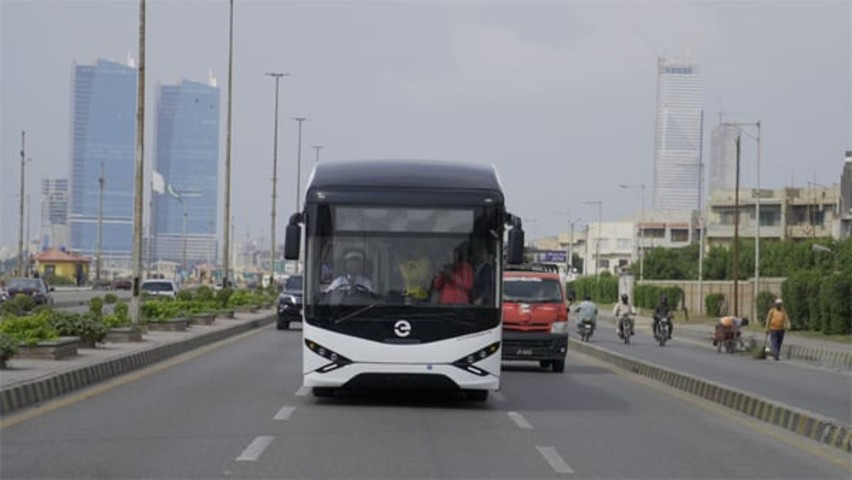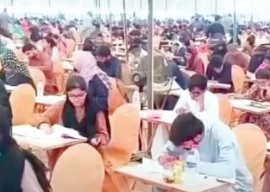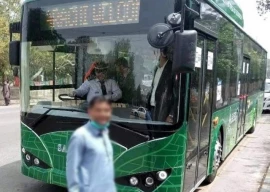
At a time when the country’s debt has ballooned to hundreds of billions of dollars and there is a consistent reliance on the International Monetary Fund (IMF) to rescue Pakistan, eyebrows are being raised over the suitability of electric buses purchased by the Sindh government for its capital city.
In December of last year, when cries of the country being on the verge of default were being heard left, right, and centre, the Sindh government imported 40 electric buses, at a cost of 450,000 dollars each, to address Karachi’s public transport needs. Subsequently, in January of this year, the buses began service on 3 routes of the city. However, it has now transpired that a significant majority of the electric buses, which cost a whopping 18 million dollars to procure, have been grounded due to technical reasons.
An investigation carried out by the Express Tribune into the matter shows that 25 of the 40 buses were grounded recently and only 15 electric buses are currently operating on 1 of the 3 designated routes for the electricity powered vehicles.
This seemingly mammoth waste of taxpayer money does not surprise Hafiz Naeem-ur-Rehman, leader of the Jamaat-e-Islami (JI) Karachi. “Had the Pakistan People’s Party (PPP) government carried out a feasibility report prior to procurement, they would have realised that such expensive buses are not meant for the port city’s roads,” asserted Rehman, further adding that instead of doing their due diligence, the PPP purchased the buses to increase their vote bank in the elections.
Read Two electric bus service routes temporarily closed
“Just for personal gains the PPP has wasted taxpayer money on buses that will probably now rot away. This is nothing short of cruelty and an assault on the public exchequer,” the JI leader remarked.
Concurring with Rehman’s sentiments, Muhammad Asif, who lives in Johar Chowrangi and used the electric buses a few times, told the Express Tribune that the electric buses were replaced with hybrid buses. “Two months ago while I was on one of the new electric buses on the EV-3 route, it met a charging issue. Ever since then diesel hybrid buses have been operating on the EV-3 route,” elaborated Asif.
Najma Akbar, also a regular commuter on the same route, agreeing with Asif’s information said that it had been a while since she had seen the white electric buses as they had been replaced with the red hybrid buses.
“It is comical that the Sindh government purchased extraordinarily expensive electric buses only to replace them with hybrid buses just months later,” opined Dy Syed Nawaz-ul-Huda, a regional planner based in the city. According to Dr Huda, the port city’s infrastructure is not fit for any buses let alone electric buses “therefore to purchase such pricey buses is equivalent to shooting oneself in the foot.”
“Even if the government brings the electric buses back, the charging stations are few and far between. The buses will end up being grounded again,” the regional planner predicted.
NED University’s Professor Dr Noman Ahmed, who is an architect and planner, agrees. “It is ironic that the government saw it fit that a city marred with load shedding issues will be able to operate electric buses,” critiqued Dr Ahmed, further adding that the inept provincial government had dented the public kitty for a flawed project.
“Had they directed the exorbitant money towards improving the existing infrastructure of public transport or roads, residents of the city would have been better off. It is unfortunate that the government pursued such a costly image building project but it makes sense because they have nothing else to show in terms of development,” the professor added.
Nevertheless, Kamal Hakim Dayo, Managing Director of the Sindh Mass Transit Authority, does not agree with the criticism. “This is a pilot project and we plan to introduce more electric buses. People do not see that these buses will help curb pollution in the long run. As for the grounded buses, they will be operational soon,” claimed Dayo while talking to the Express Tribune.
A correction was made on December 2, 2023: An earlier version of this article misstated the cost of each bus. The correct cost is $450,000 for each electric bus, not $4.5 million. We regret the error.
Published in The Express Tribune, November 27th, 2023.




1730959638-0/trump-(19)1730959638-0-165x106.webp)















COMMENTS
Comments are moderated and generally will be posted if they are on-topic and not abusive.
For more information, please see our Comments FAQ